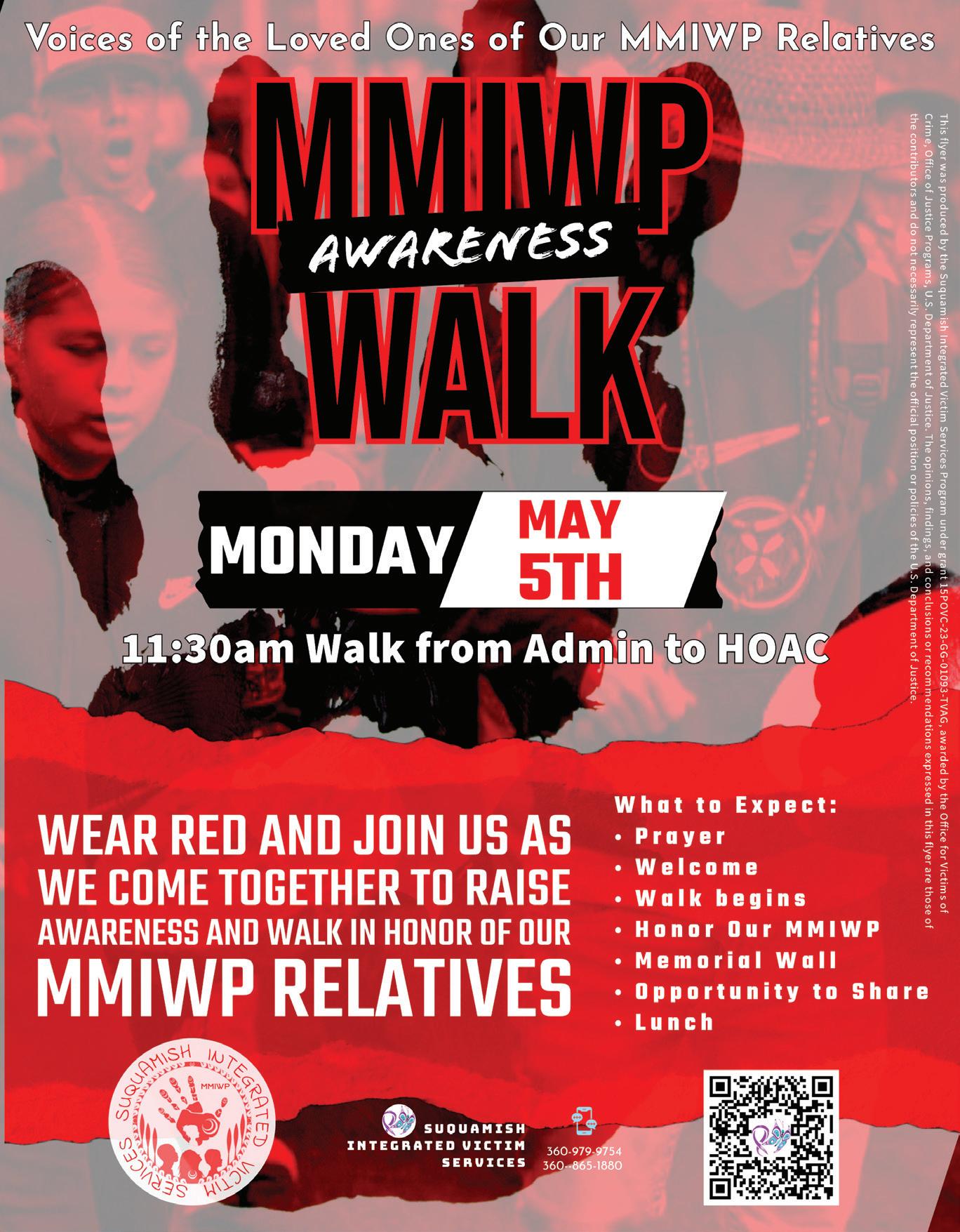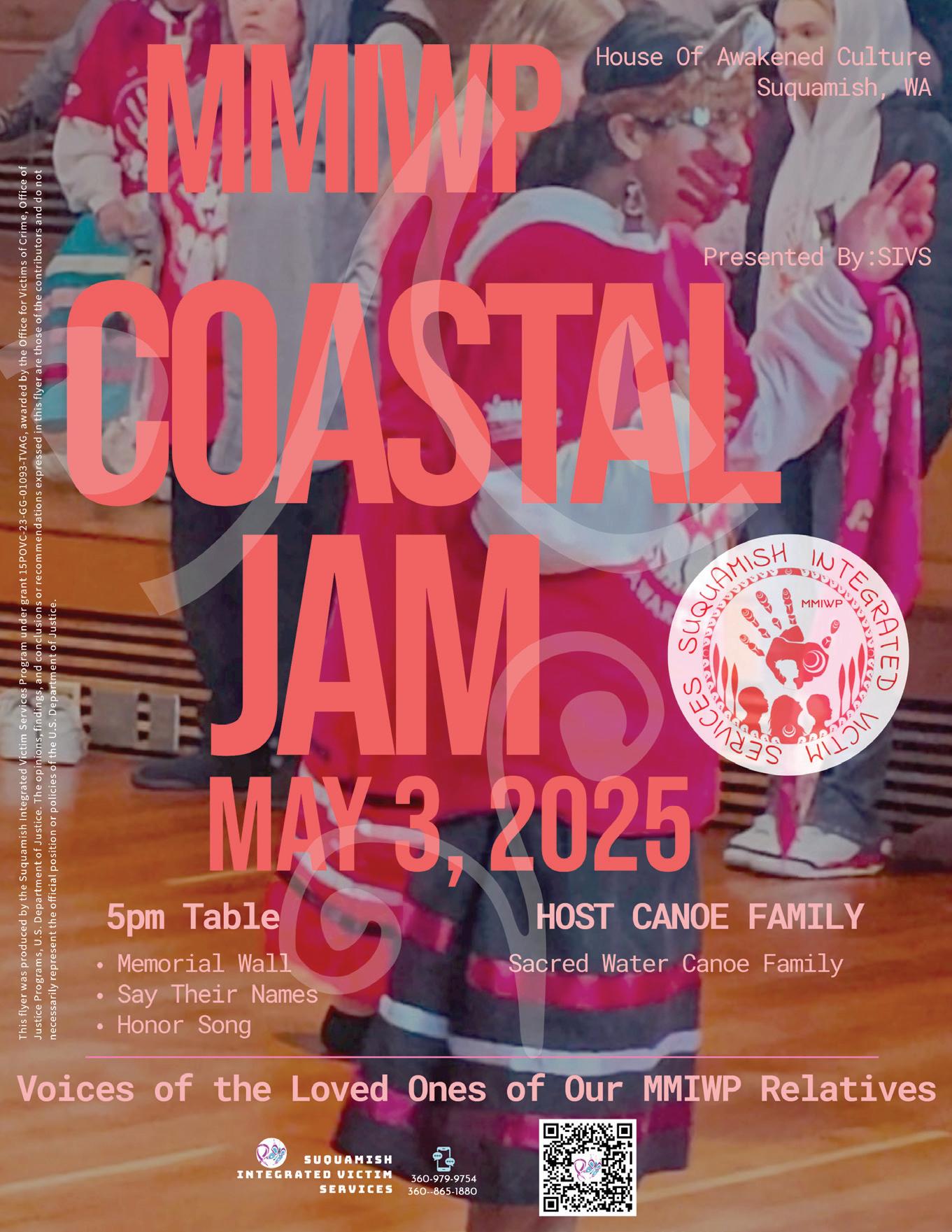




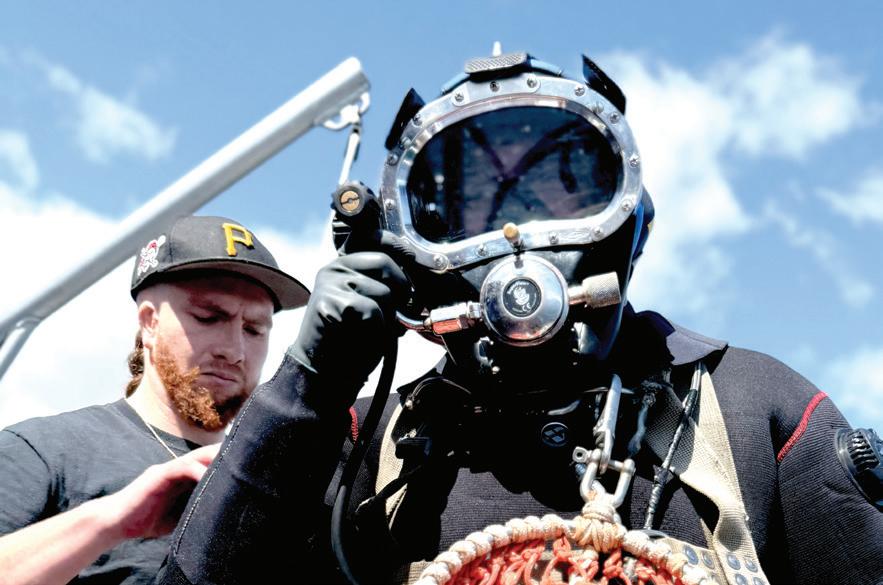
In this Issue:
Restoring the Salish Salmon P4
Chairman’s Report P6
Mental Health Awareness, P11
Elders study Lushootseed, P13
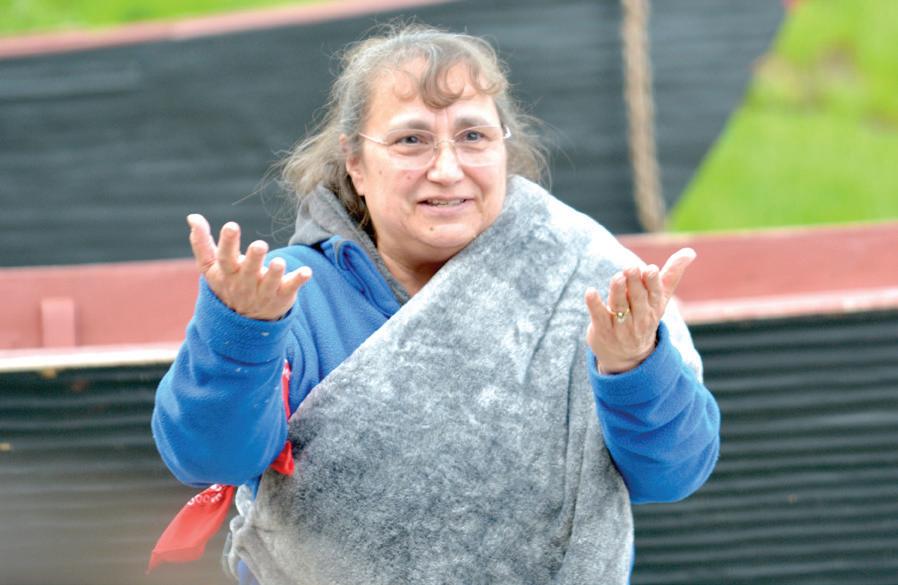
Tribal Canoes Awakened, P5
Suquamish Tribal Council meets May 7 & 19. Agenda and links sent via SUN Weekly Update & SUN text.
Suquamish Tribal Gaming Commission meets May 13 & 27, 10am at the Gaming Commission Bldg. Call (360) 394-8652 for details.
Suquamish Warriors meets May 6, at 5:30pm at the Warriors Vet Center.
Suquamish Seafoods Board next mtg TBD. Call Shanel Carlson at (360) 394-8512 for details.
PME Board meets May 14. Contact Emily Sato at emilysato@clearwatercasino.com for details.
Suquamish Museum Board meets May 15, 10am-noon at Museum. For info call (360) 394-8499.
Recovery Meetings. All are welcome to recovery meetings, held Mon-Fri, 6pm at the Wellness Center.
Wealth & Wellness Workshop April 29-30. More info (360) 908-7210.
MMIWP Week of Awareness
April 28-May 2.
MMIWP Coastal Jam May 3, 5pm Table. House of Awakened Culture.
MMIWP Awareness Walk May 5, 11:30am start at Admin Building to HOAC.
Culture Night May 7. House of Awakened Culture.
A Time To Gather May 29, Kiana Lodge 6-9pm.
Veteran’s Garage Sale May 2-4. Fri. 12-3, Sat. 9-3, Sun. 10-3. 6353 Middle Street, Suquamish. To donate items or get more info, Call John Thompson (360) 394-8515.
“Environmental justice is our Suquamish tradition,” says Tribal artist Jeff Riggins. Drawing on that as his inspiration, Riggins created the design featured on our cover and used for an Earth Day event hosted by the tribe. The central face represents the Earth itself, with a human figure holding the scales of justice. Surrounding elements evoke the sun’s rays and the interconnected forces that sustain life. The imagery reflects both balance and responsibility—core values in Suquamish teachings about protecting land, water, and future generations.

Published monthly by the Suquamish Tribe: 18490 Suquamish Way, Suquamish, WA 98392
Email us at: communications@suquamish.nsn.us
Send letters to: Suquamish News Editor, PO Box 498, Suquamish, WA 98392-0498
Letters should include the writer’s full name, address, and telephone number and may be edited for clarity and space.
All photo submissions must be made in JPG or PDF form, with resolution of 300 dpi or more.
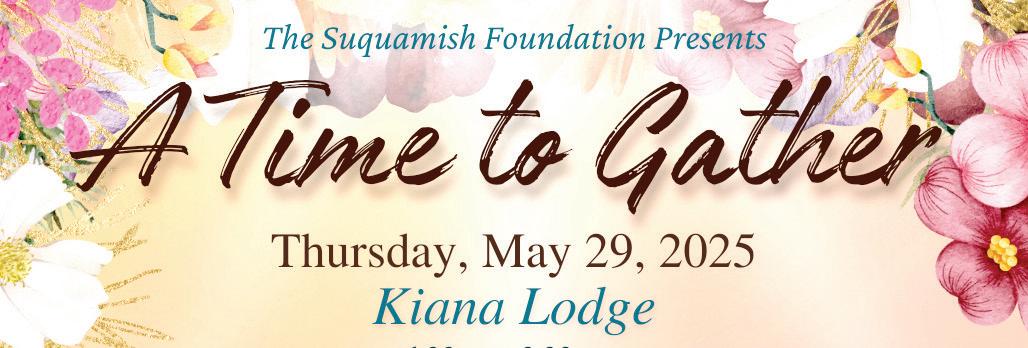
Leonard Forsman Chairman
Josh Bagley Vice-Chair
Irene Carper Secretary
Andrew George Treasurer
Lorilee Morsette Member
Azure Boure Member
Luther Mills, Jr. Member
Suq uamish Museum Museum Events May
May 4th Sun, 10am-1pm. May the 4th Be With You! Beaded Earrings Workshop with Jo Citlali
May 7-11, 9am- 4pm. FREE Mother’s Day Paper Flower Bouquet craft.
May 10 Sat, all day. FREE Museum Admission
May 10 & 11 Spring Cleaning, Shop for A Cause - Museum Fundraiser
May 17 Sat, 10am-2pm. Cedar Paddle Earrings Workshop with Lisa Jackson
May 24 Sat, 9am-4pm. FREE Scavenger Hunt with the Museum & the City of Poulsbo. More info coming soon!
May 24-31, 9am-4pm. FREE Admission for Military Personnel Thank you for you service!
More info: SuquamishMuseum.org
Leonard Forsman Editor-in-Chief
Catherine Edwards Executive Editor
Jon Anderson Managing Editor
JoAnn Joe Photography/Design
Georgia Browne Layout and Design
Editorial Policy
Publishers of the Suquamish News reserve the right to refuse publication of letters to the editor and guest editorials. Submission of editorials and letters is encouraged. However, they represent the opinion of the author and not necessarily that of the Suquamish Tribe. As such, we reserve the right to refuse to print any letter, for any reason.
Forthe first time since the Suquamish Tribe launched its commercial geoduck harvesting operations in the 1990s, divers stayed out of the water this April. Aside from a brief sample dive on April 21 — when Joshua George pulled five geoducks to test the safety of a potential harvest area — no diving has occurred since mid-March.
“This is the first time in 24 years I’ve gone a whole April without working,” George said. “It’s stressful. We’re watching our money disappear.”
The silence on the water comes as the result of steep tariffs imposed by the Chinese government, an 84% hike in April alone, rendering the tribe’s primary export product too expensive for its core overseas market.
“This has a domino effect on the entire Tribe,” said Suquamish Chairman Leonard Forsman. “The tariffs hit our enterprise, which affects how much our divers earn, how much we can invest, how our families get by. This is a treaty-protected activity— something we fought to affirm back in 1995. And now, it’s being throttled by decisions made thousands of miles away.”
Forsman said the tribe is working hard to make its concerns known to policymakers and fight for relief from the federal government.
The current trade war began this year when the new U.S. administration levied sweeping new tariffs on economic partners and adversaries alike. China, like many countries, responded with its own tariffs on U.S. exports.
Tariffs are taxes placed on goods imported into a country. While designed to protect domestic industries, they can also have dire consequences — especially for small, export-reliant economies like Suquamish Seafoods.
Geoduck is a luxury item in China, prized for its freshness and traditionally served at banquets and celebrations. But with tariffs now exceeding 100%, the once-thriving trade has ground to a halt.
Jim Boure, General Manager of Suquamish Seafoods, said the shutdown has been devastating.
“We normally pull in about $100,000 a week in

For tribal members like Tyleeander Purser, who tends boats and supports the divers, geoduck harvesting is more than a job — it’s a direct connection to heritage.
“This is something our people have always done,” Purser said.
“Geoduck is the only Lushootseed word that made it into the English dictionary. That says something about how central it is to us.”
Purser described how traditional harvests once relied on tides and digging by hand — skills passed down through generations.
Today’s divers use sophisticated gear to reach deepwater tracts, but the spirit remains the same.
“Geoduck helped lift our tribe out of poverty. Our seafood enterprise created jobs, funded programs, and gave us economic independence. Now that’s all in jeopardy.”
For George and fellow diver Kyle Purser, the uncertainty is as personal as it is professional.
“I’ve been doing this 24 years,” George said. “I don’t have a plan B. I didn’t go to college. This was my career.”
geoduck sales this time of year,” Boure said. “Right now, we’re at zero.”
Without orders, the company can’t harvest. The product is too delicate to store. Geoduck must be shipped live and arrives in China within 24 hours of being pulled from Puget Sound. With no one buying, no one is diving. And the effects ripple far beyond the waterline.
“Our divers are independent contractors, but we also have plant workers, tenders, logistics staff,” Boure said. “We’re still paying for maintenance, sample testing, and other overhead just to keep things running. But that’s not sustainable for long.”
Boure estimates they have six to nine months of financial runway left without relief or a major market shift. “If we’re out much longer, we’ll have to scale down dramatically—or worse.”
Both men are raising families and said the work has allowed them to spend quality time with their children while earning a good living. But now they’re scraping by, living off savings and the occasional side job—if they can find one.
“We’re resilient,” said Purser. “But this has shaken us. If we have to start over at 40, that’s a big ask. Not just for us, but for our kids.”
George put it more bluntly: “This isn’t hurting the people who set policy. It’s hurting guys like us—who work hard, who pay taxes, who just want to provide.”
Despite the hardship, both divers say they’re holding onto hope.
“If we can get back to work soon, we’ll rebuild,” Purser said. “But we need people to understand— this isn’t just about shellfish. It’s about sovereignty, survival, and staying connected to the water.”
By Jon Anderson Suquamish News Staff Writer
Truesalmon recovery will not be achieved until we have sustainable, harvestable populations that support treaty tribes’ culture and way of life.
The alternative is a future where salmon are treated like museum displays—look but don’t touch.
As my mentor the late Northwest Indian Fisheries Commission Chairman Billy Frank Jr. once said, “We are not interested in museum fish.” Salmon conservation is meaningless if we have to sit on the banks and watch the fish swim by.
Ours is a living culture that depends on our being able to exercise our traditional, constitutionally guaranteed treaty rights to harvest salmon.
In the documentary FISH WAR, Stillaguamish Council Member Kadi Bizyayeva talks about the impacts on her tribe of not being able to harvest salmon meaningfully for more than a generation.
“Finding our value now without the salmon, it’s hard,” she says. “It has created a huge disconnect from our Elders to our youth. Those traditions have kind of stopped being passed down. There’s a lot that our youth aren’t able to see or learn or practice, and there’s a lot that our elders can’t teach.”
To reach our recovery goal, tribes are doing everything we can to restore habitat and are working to rebuild salmon stocks so that when we develop fishing seasons with our state co-managers, there is a harvestable surplus for us to share equally.
One of the ways we are rebuilding salmon populations is with a robust system of tribal and state hatcheries that provide harvest opportunities for everyone in western Washington.
At least 70% of the salmon caught by tribal, sport and non-tribal commercial fishers are hatchery fish.
Hatchery enhancement programs also help rebuild and maintain populations of at-risk salmon that otherwise would have gone extinct, as well as provide food for our struggling Southern Resident Orcas.
Unfortunately, we continue to see misinformation being spread by organizations that use thinly supported, insular research to falsely claim that hatcheries are standing in the way of salmon
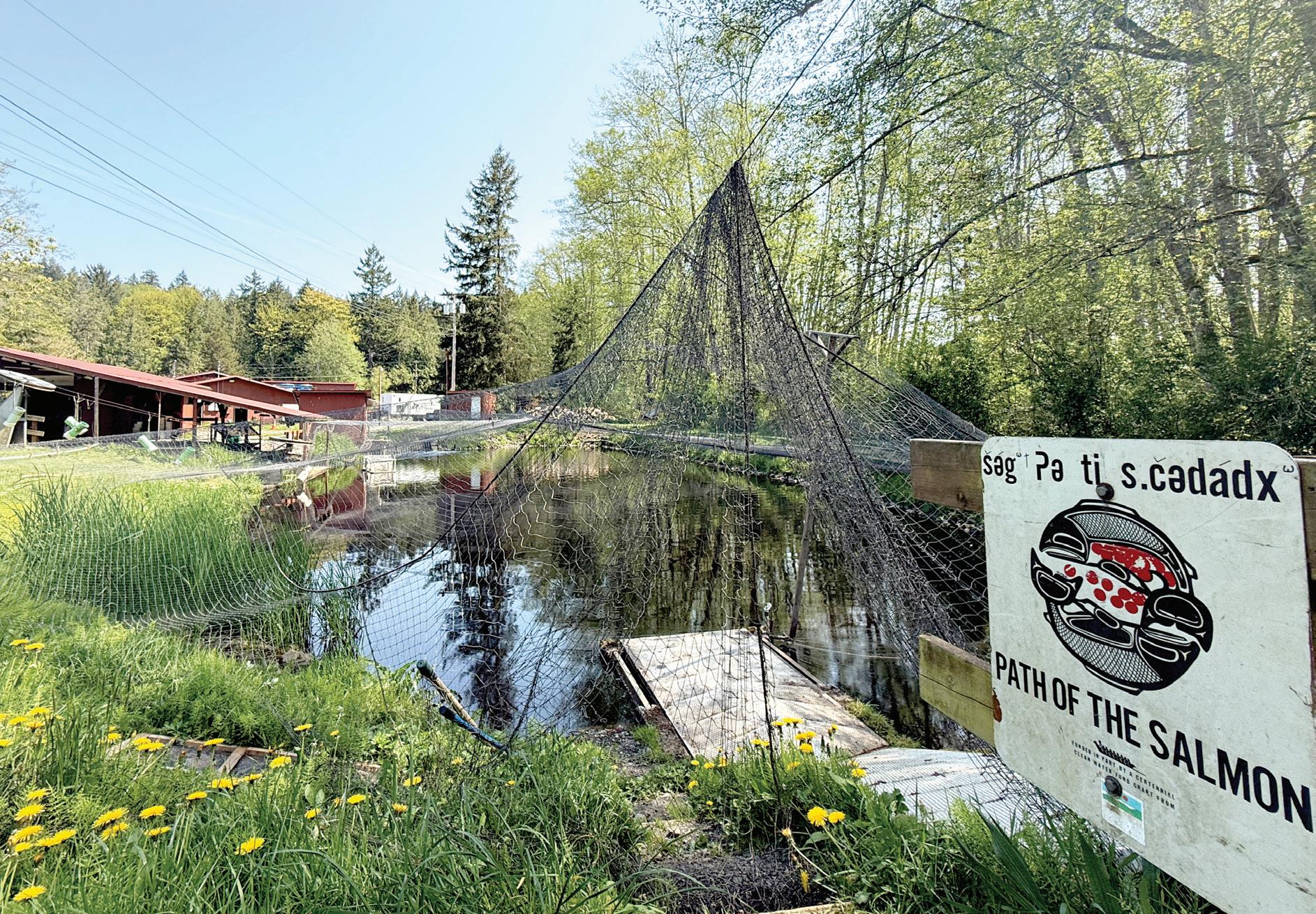
recovery. These so-called conservation organizations file lawsuits using the Endangered Species Act as a weapon against treaty rights, trying to dismantle programs actively putting more fish in the water.
Unbelievably, these groups pretend to have the support of tribal nations, when they do not speak for us.
The truth is, tribal hatchery practices continue to evolve with best management approaches and are on the cutting edge of conserving diversity and maintaining production. Tribes manage our hatcheries to protect natural production.
Hatchery programs have improved genetic diversity, increased abundance, and in many places have supported populations at risk. Tribal hatcheries do not cause the loss or reduction of salmon populations.
The tribes are not to blame for destroying salmon spawning and rearing habitat, but we have tak-
en on the responsibility to keep their populations alive. Our hatchery programs can lead to future generations of naturally spawning fish.
This year, we’re facing a state budget that could reduce hatchery funding, leaving tribes to make up for the deficit. This is not new territory. We’ve had to rescue state hatchery operations in the past, for example on the White River and Sol Duc River, but this is an unfair financial burden for the tribes to carry.
Treaty tribes will do whatever it takes to recover harvestable numbers of salmon. Our vision of conservation is complete salmon recovery, ensuring sustainable harvest for the next seven generations.
We are never going to give up on fishing, and we are not interested in museum fish.
By Ed Johnstone Northwest Indian Fisheries Commission Chairman
Ceremony marks shift into spring, honors traditions and the spirit of the canoe
Brushedgently with freshly cut cedar to the sound of drums and song, Suquamish canoes were awakened from their winter slumber in a ceremony April 9.
Along with the four chosen witnesses, a pair of young eagles kept watch from the trees nearby, making occasional passes overhead. Canoe family skippers offered words of gratitude to those assembled and enthusiasm for the upcoming Canoe Journey to Elwha this summer.
Led by Cultural Activities Coordinator Denita Holmes, the ceremony honors the belief that canoes, like people, need time to rest and to rise again with intention.
“The canoe has a spirit, it is a living thing,” Holmes said. “Waking it up is a way of recognizing that it’s time to move again.”
Though the practice is relatively new for Suquamish, it is rooted in traditional teaching. “Back in the day, our families used canoes year-round. They didn’t sleep. But this practice — which we started doing about 15 years ago and is part of the traditions of other tribes — feels right for us. It’s a way to reconnect and honor where we are now,” Holmes said.
The canoes are brushed with cedar boughs dipped in water collected by young women who are guided through the process with prayer and intention.
“The cedar comes from the grandmother tree — the same tree that gives us the canoe,” Holmes said. “Brushing it down is like giving it a cleansing bath to help it rise from sleep.”
Four tribal community witnesses were called forward to observe the ceremony and affirm its integrity.
“It may not be exactly what we did 100 years ago, but it’s good work,” said Holmes. “Culture is alive — it changes and grows. And this is part of our way of being today.”
By Jon Anderson Suquamish News Staff Writer
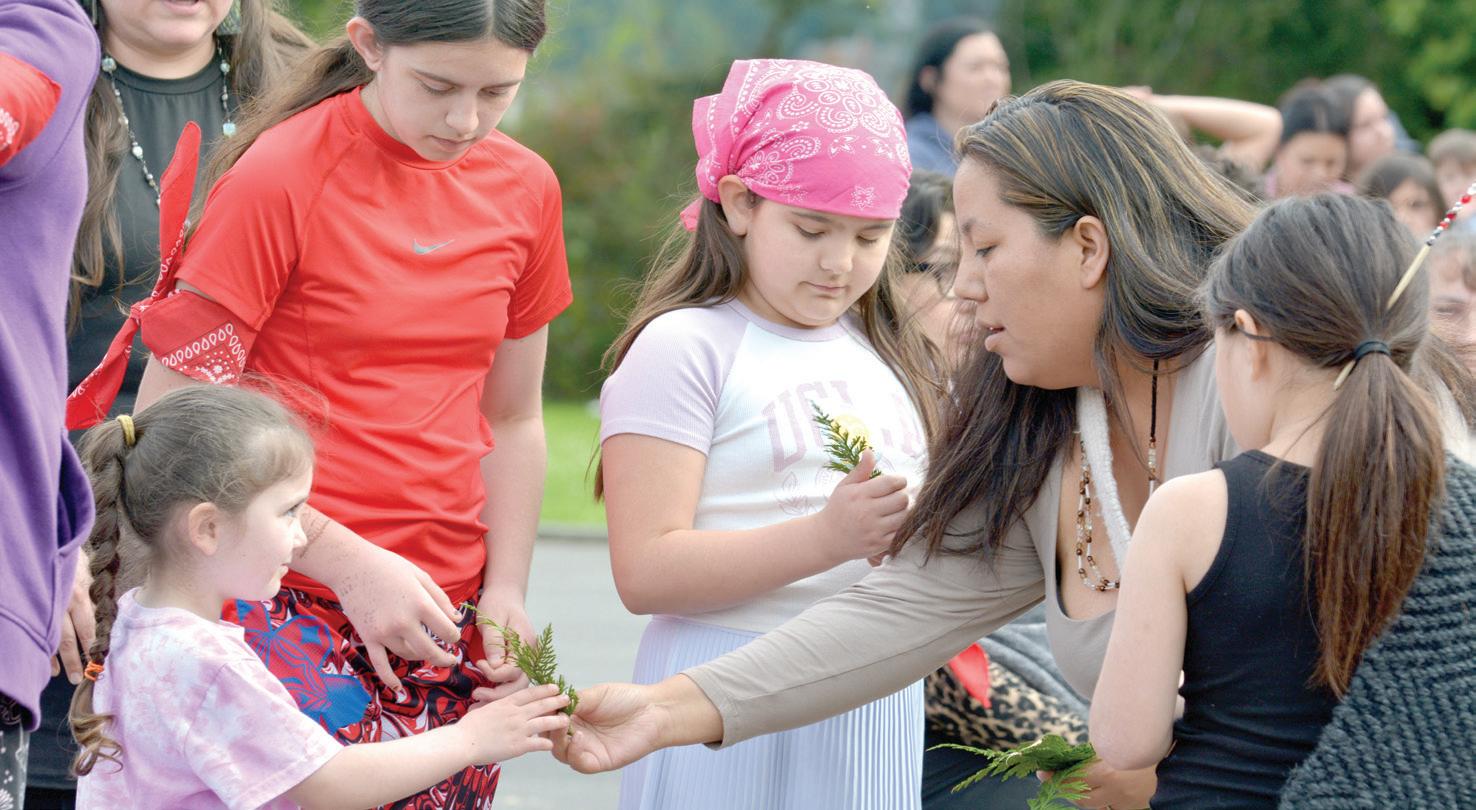



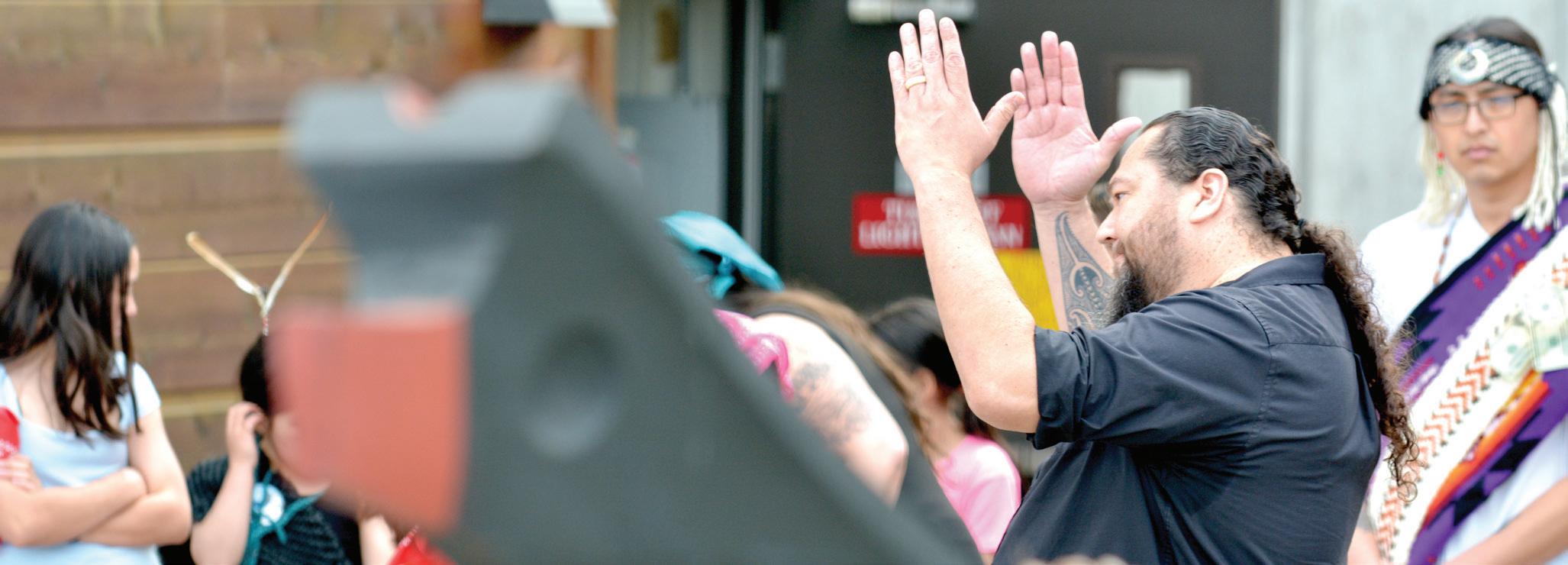
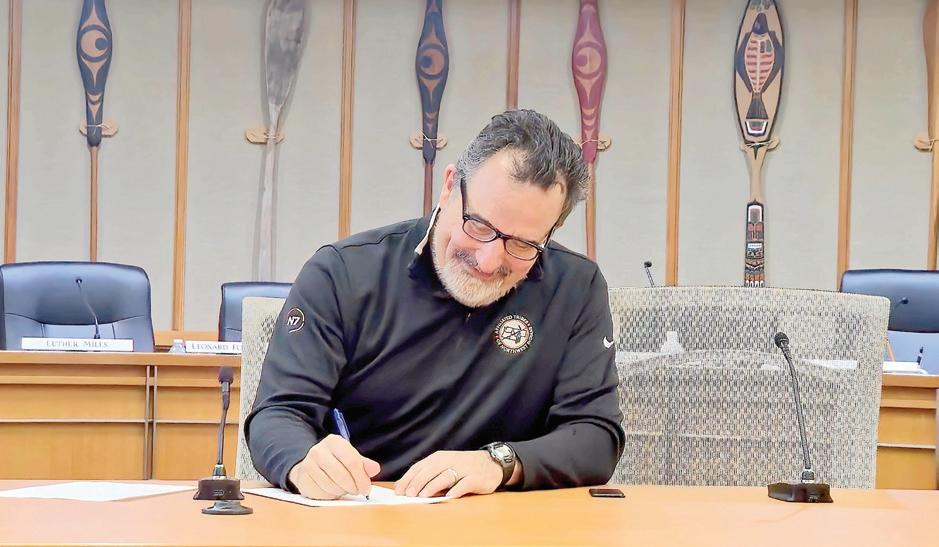
Aswe move into the spring season our work here at the tribal government is increasingly focused on working with local, state and federal government officials and agency staff to protect our natural resources, invest in our tribal economy, and improve our health care systems.
Unified voice needed now more than ever Northwest tribal leaders convene frequently to fortify and build upon our unity to protect and promote our sovereignty. This unified voice is needed now more that I can ever remember.
The federal government was already underfunding tribes before 2025. Now, further cuts and disruption to federal agencies, including the Indian Health Service and the Bureau of Indian Affairs, would be devastating to tribal public safety, health programs and tribal schools.
These issues were front and center at The Affiliated Tribes of Northwest Indians Executive Board meeting to review the agenda for our mid-year conference at Northern Quest Casino, in Airway Heights near Spokane.
At the conference, we will be discussing and developing strategies for protecting our sovereignty and reminding the federal government of their trust responsibility to tribes as they recklessly slash budgets and staffing.
Meanwhile, we have been working with our DC team to preserve Head Start funding from proposed elimination within the President’s budget.
As the Congress addresses the current and future budgets, we will be working hard to protect this funding for our Early Learning Center programs
that have had such a positive impact on our youngest learners – both from the tribe and our neighbors – over the years.
We are also working with our intertribal organizations, including the NW Portland Area Indian Health Board, to protect Medicaid from potential cuts. Medicaid is crucial to supporting our underfunded health programs through third party billings for patients in our Wellness Program and our Health Clinic.
This will also require intensive interaction with Congress as budgets are being developed.
The Office of the Superintendent of Public Instruction (OSPI) held a two-day Washington State Tribal Education Leaders Summit in April at Washington State University in Pullman to discuss tribal education issues with tribal council members and policy leaders.
The first day we heard from OSPI staff, including staff from the Office on Native Education, and tribal government representatives about different subjects including funding, data, language preservation, and curriculum.
The second day we met directly with State Superintendent Chris Reykdal about his vision for improving tribal education and schools overall. He was clear about his respect for tribal values and traditions and the need for change to modernize our schools to support priorities of tribal language retention and implementation of tribal culture and history curriculum to increase the success of our students.
The Washington State Partners for Ecosystem Recovery held its quarterly meaning in a hybrid format. We received an interesting discussion of sea level rise impacts on Kitsap shorelines and methods for protecting uplands from future flooding.
I also attended HEAL Act event held at Kiana Lodge hosted by the Suquamish Tribe’s Community Health Department. The event focused on practical ways we can adapt and support each other. This was a great gathering that featured info booths, gifts, raffles, and a delicious lunch with inspiring words from Calina Lawrence to help encourage
healthy climate adaptations in our community.
The Alliance for Indigenous Environmental Stewardship met at our House of Awakened Culture to align their priorities for preserving natural resources in tribal lands and waters. I provided a welcome to the group, who later had a chance to pull in one of our traditional canoes.
Representatives of the U.S. Coast Guard traveled to Suquamish for a meeting with Tribal Council members and staff. The Coast Guard provided an overview and update on their Base Seattle Programmatic Environmental Impact Statement (PEIS) for their facility at Pier 36 on the Duwamish Waterway.
The PEIS considers multiple alternatives for expansion and modernization of the base, including the acquisition of additional land, the demolition and construction of facilities, and utility upgrades among other improvements required, including berthing ships outside of the inner pier area, to support Coast Guard personnel and assets. We are assessing the project’s potential impacts on treaty fishing activity.
Representatives from Olympic College and the City of Poulsbo met here to provide an update on the Olympic College/Kitsap Economic Development Alliance Health Sciences Initiative. Olympic College, with the support of KEDA and other allies, is building a new regional health sciences hub at its Poulsbo campus to house new health care education programs to train new health professionals. This is intended to supply labor to the greater health care system that is currently understaffed.
The Evergreen State College held its third annual Elected Tribal Leader Academy at the Suquamish Clearwater Casino Resort. Roughly forty elected officials from tribes around the Northwest and some from the Great Plains attended the event. I was honored to provide a welcome and serve on a panel outlining my experience as a member of Tribal Council.
The Washington Indian Gaming Association held its monthly meeting virtually. We received a report on public relations and also met with rep-
(Continued from p6)
resentatives of the Washington State Gambling Commission to discuss regulatory issues.
We have been having regular meetings with the Washington State Department of Transportation on the Gorst Planning and Environmental Linkages Study that is exploring alternatives to address congestion on State Route 3 and SR 16. Some of the alternatives being studied include expanding the existing highway, building an overland bypass and constructing a bridge over Sinclair Inlet. We will continue to be engaged in analyzing the alternatives as they develop through the review process.
The Suquamish Culture Committee held its monthly meeting at the Sandy Hook Tribal Center. The agenda included a report on the Burke Museum and their tribal outreach programs and invitation for increased collaboration with the Suquamish Tribe.
There was also an update on the planning for the Suquamish Tribe’s Renewal Powwow and information from the Suquamish Warriors on the addition of names to the Veterans Memorial and their participation in the upcoming Bremerton Armed Forces Day Parade.
Canoe Journey will be upon us soon. I’m looking forward to hosting canoe families here on our shores and getting back on the water for the pull to Elwha. In the meantime, I encourage all our tribal members and families to engage with our culture, enjoy our waters, and explore our lands in whatever ways bring you joy.
By Leonard Forsman Suquamish Tribe Chairman
Tribal members can find open session times, agendas, and Zoom links in the SUN Weekly Update, every Friday before the next Council meeting. Look for recaps of what was discussed the following week.

MONDAY



Noteveryone needs to do everything—but everyone can do something.
This was the central invitation Calina Lawrence extended to more than 200 people gathered at Kiana Lodge for the Suquamish Tribe’s Earth Day celebration April 22, an event designed to spark conversation and encourage tangible steps toward environmental and climate justice.
The gathering was made possible through HEAL Act grant funding and hosted by the tribe’s Community Health program. Attendees shared a meal, visited educational booths, and heard from speakers about the urgent need for collective action to protect the land, water, and future generations.
Community Health Manager Jeff Riggins opened the program by connecting the event to the HEAL Act, a Washington State law passed in 2021 to ensure that communities disproportionately affected by environmental harm have a voice in policy decisions.
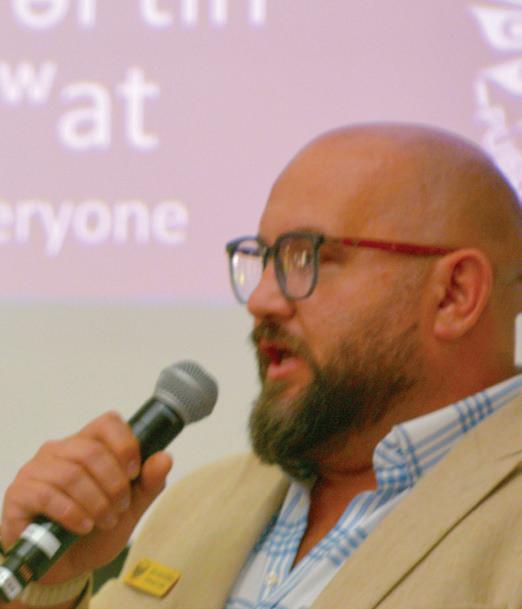
“We have to speak up for ourselves. We have to protect our culture. We have to protect our environment. That’s environmental justice. And that’s why we’re here today,” Riggins said. “Taking care of the environment, making sure we’re not wasting money, and ensuring future generations have something to be a part of.”
He urged attendees to use the event as a launchpad for action. “Your input matters,” he said. “We need to have these discussions. Environmental justice is making sure that communities like ours, which are impacted the most, are able to speak up for ourselves, to protect our culture and our environment.”
Lawrence, a Suquamish tribal member and nationally recognized artist and activist, grounded her keynote address in gratitude, history, and a call for creative participation. She spoke candidly about the grief that can come with understanding the depth of ecological destruction, but emphasized
Food that ends up in landfills generates methane, a powerful green house gas. Composting at home, in community gardens, or through future Tribal programs can dramatically reduce emissions.
Fast fashion is one of the world’s most polluting industries. Instead of throwing away worn clothes, repair, donate, or re-purpose them. Lawrence shouted out local seamstresses Tionna Hawk and Chelsea Jones, who are open to reclaiming fabrics and turning them into something new.
Thrift stores are booming — for good reason. They reduce waste and provide economic opportunities. Lawrence suggested the Tribe or local families could even explore starting their own thrift initia tives.
From diapers to paper towels, our throwaway culture contributes to landfill over flow and pollution. Cloth alternatives and reusable items can help cut back our environ mental footprint.
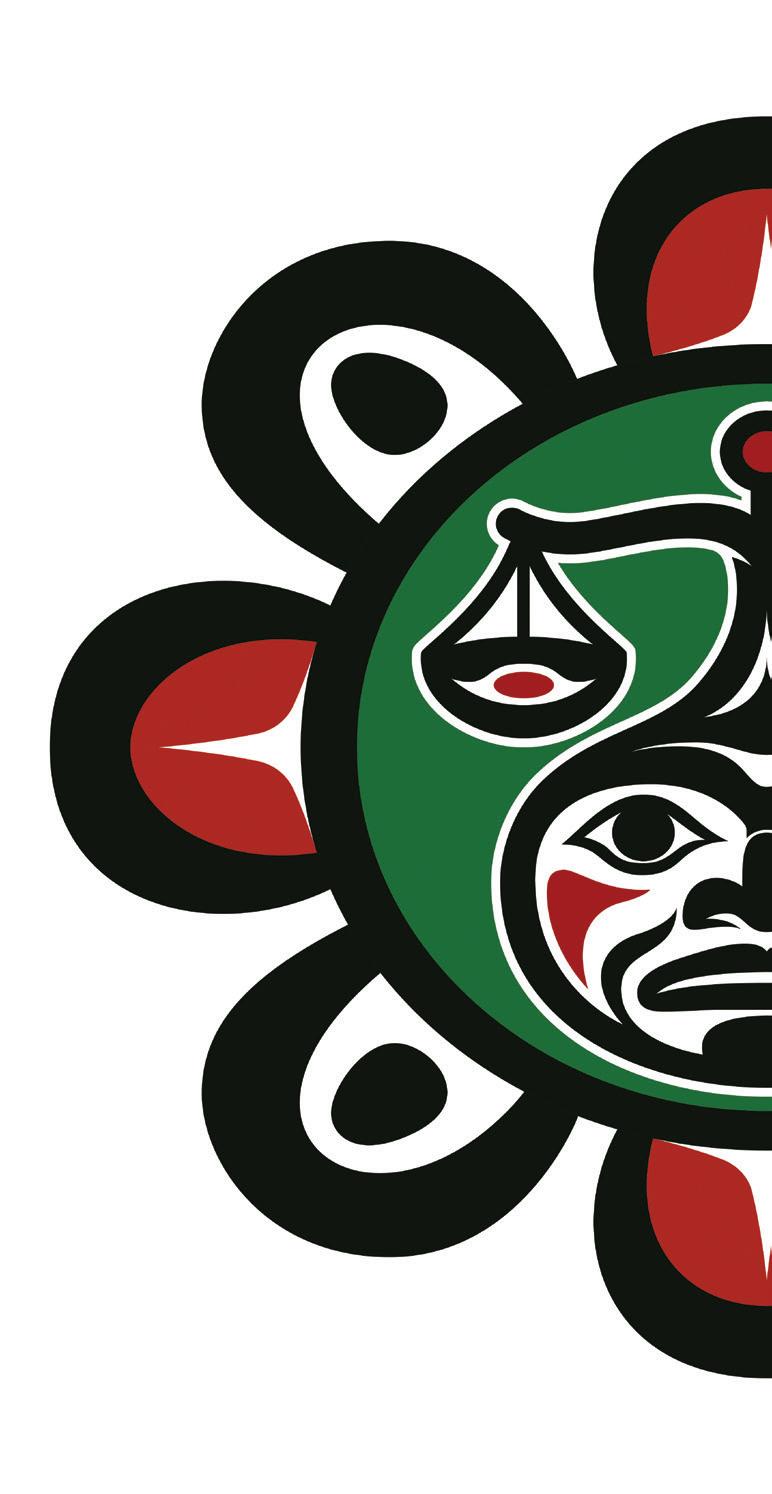
Consider supporting local ordinances that limit single-use plastics or promote sustainable practices. “We can push for bans on bottled water at community events — and offer reusable alternatives,” Lawrence said. Styrofoam and plastic straws need to go.
transformation is possible through action.
“We can be angry. We can hold grief. And we can transform that into action, so we’re not just stuck in despair,” Lawrence said. “We are capable of reclaiming the values and instructions of the place we belong to.”
Throughout her speech, Lawrence emphasized that not all efforts look the same — but they’re all vital. Whether you’re composting avocado scraps or standing on the front lines of a protecting treaty rights, each contribution matters.
Drawing from her studies in social justice and her experiences at Standing Rock and with international climate movements, Lawrence laid out a broad vision for local action. Here are ten ideas she shared —each one a tangible step toward climate justice.
“There’s room for all of us, in whatever capacity we have,” she said. “No one action is more important than another — they just have different levels of reach and sacrifice.”
She also highlighted the importance of storytell-

Walking, biking, or using public transit can make a difference. “I admire our relatives who walk our roads every day,” Lawrence said. “Maybe next time we might drive somewhere, we can take a walk instead.”
Even if you don’t have the time or resources to lead a project, sharing your ideas with others can plant seeds. “Maybe someone else will have the time to act on what you’ve dreamed up,” she said.
Lawrence shared an idea from Nic Armstrong. With diving work reduced by international tariffs, maybe divers could be paid to help clean up the seafloor — putting their valuable skills to work for environmental restoration.
“Where does our water come from? Who has access to it?” What happens if it’s exploited? Lawrence encouraged everyone to understand their aquifer, learn to harvest rainwater, and protect local water rights.
Every dollar spent is a form of power. Lawrence urged attendees to research which companies are the largest contributors to the climate crisis and to spend — and invest — their money elsewhere.
ing, language, and art as tools of awareness and resistance.
Concluding with a spoken word piece she wrote over a decade ago, Lawrence reminded the audience that art can cut through the noise and speak directly to the heart.
“Without earth, these lungs of ours are so gone. Think of the generations who will inherit this nation. Include them in our choices. It’s our job to lift their voices.”
As the meal wound down and raffle tickets were drawn, the energy in the room remained high, with many carrying new ideas for how to bring climate action into their homes, families, and community. Riggins summed it up best: “That was amazing. We had poetry, we had truth — and most importantly, we have people ready to do something.”
By Jon Anderson Suquamish News Staff Writer

— A Call from Calina Lawrence
Sometimes we have to push ourselves outside of our comfort zone. Sometimes we have to sacrifice a little bit more for protection of our rights, for protection of our sources and our resources.
There are multiple instances in our tribe’s history where we had to put our lives on the line to protect our sources of life. That’s here in Suquamish, and that’s across Indian Country.
I’m talking about fighting back against exploitation. I’m talking about the warrior spirit in the people who are here still — that there might come a day where that warrior spirit is speaking to you.
And you have to get creative about saying: When I was alive in 2025, and this was happening to the earth by a handful of people, I was one of the people that said — with my actions, my body, and my intentions — “I don’t condone this. I don’t accept this. I won’t be thankful for this. I must do something. Anything.”
1 - June 23

Dates and Locations
Indianola: May 1-4
Eaglemere: May 8-11
Adams: May 15-18
George Lane: May 22-25
Tuckers Topsoil: May 29-June 1
Wee Wun: June 5-8
Sackman: June 12-14 & 18-22
Hours
Thurs – Sat: 10am – 5pm Sunday: Noon – 4pm
Items Accepted: Household Trash, Appliances, Furniture, Mattresses, Electronics (TVs, computers, printers, etc.)
Items NOT Accepted: Oil, Anti-freeze, Fireworks, Propane tanks, Hazardous waste of ANY kind
If you have larger quantities, or any questions, or need assistance, please contact:
Shane Crowell
Solid Waste & Environmental Quality
Program Manager (360) 536-1672
shanecrowell@suquamish.nsn.us
Jaime Lawrence
Solid Waste Coordinator (360) 471-3500
jaimelawrence@suquamish.nsn.us
U.S. Coast Guard boat safety inspections are required prior to renewing and receiving boat stickers. Fisheries staff are scheduling boat inspections in 30 minute appointments on May 12 & May 31 from 10am-3pm.
These safety inspections include checks for life jackets, flares, fire extinguishers, boat registration, etc. Click here for more details. Fisheries also has inspection forms available with compete requirements based on size of boat.
To reserve your inspection slot, call the Fisheries Admin staff at (360) 394-8438, (360) 3948450, or (360) 394-1332.
If you have numerous boats, your boat is kept at a marina, or you cannot make these dates, you can request an inspection at your location by calling (206) 217-6208, or email secseadispatch@ uscg.mil.










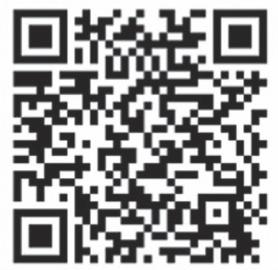
May is Mental Health Awareness Month
Explore events that nurture mind, body, and spirit
Come join the Suquamish Tribe’s Wellness Center for a full month of healing, movement, and connection. Whether you’re dropping in for a moment of reflection or gathering with others for a walk or movie night, these events are all about caring for the whole self — mind, body, and spirit. Everyone is welcome!
Every Weekday: Prayer Tie Drop-In
Stop by the Wellness Center lobby any weekday to create a prayer tie. We’ll provide materials and a quiet space for this meaningful practice of expressing prayers, intentions, and gratitude. Each tie includes medicine such as tobacco, cedar, sage, or sweetgrass, bundled in fabric and tied with others to form a growing line of community intention.
Every Monday: Walk/Jog/Run/Fun
4:30pm • Suquamish Admin Parking Lot
Starting in May and continuing through September, join us for weekly group walks or jogs on rotating routes (2.5 to 3.5 miles). Go at your own pace — everyone is cheered on and high-fived at the end! Free water, snacks, and a special surprise for completing 10 sessions.
Every Friday: Mid-Day Yoga
12:05pm • Lawn Outside the House of Awakened Culture
Reconnect with your body and spirit during this gentle yoga session led by Kylee and Crissy. All levels welcome—bring a mat or towel and enjoy the fresh air and community support.
May 27: Beyond Dieting Group
5:00pm • Wellness Center
This new group is now meeting on the fourth Tuesday of every month to explore mindful eating practices through non-diet-based approaches. Facilitated by Wellness Counselor Crissy Anderson and Suquamish Nutritionist Rachel Parsons. Open to all!
May 29: Movie Night – Playing for Keeps
5:30–7:30pm • House of Awakened Culture
Join us for a relaxed evening with a screening of Playing for Keeps, a documentary that explores how communities use sports and recreation to support youth mental health and cultural connection. A light dinner will be served, with fun giveaways like frisbees, hula-hoops, jump ropes, and bubbles — plus a few special raffle prizes!


If you cannot walk away when you’ve reached your limit, or if you find yourself preoccupied with thoughts of gambling or in conflict with others because of your gambling activity, we can help.

For more information on any of these events, call the Health & Wellness Center at (360) 394-8558.
By Susannah Hart Stephens Wellness Center
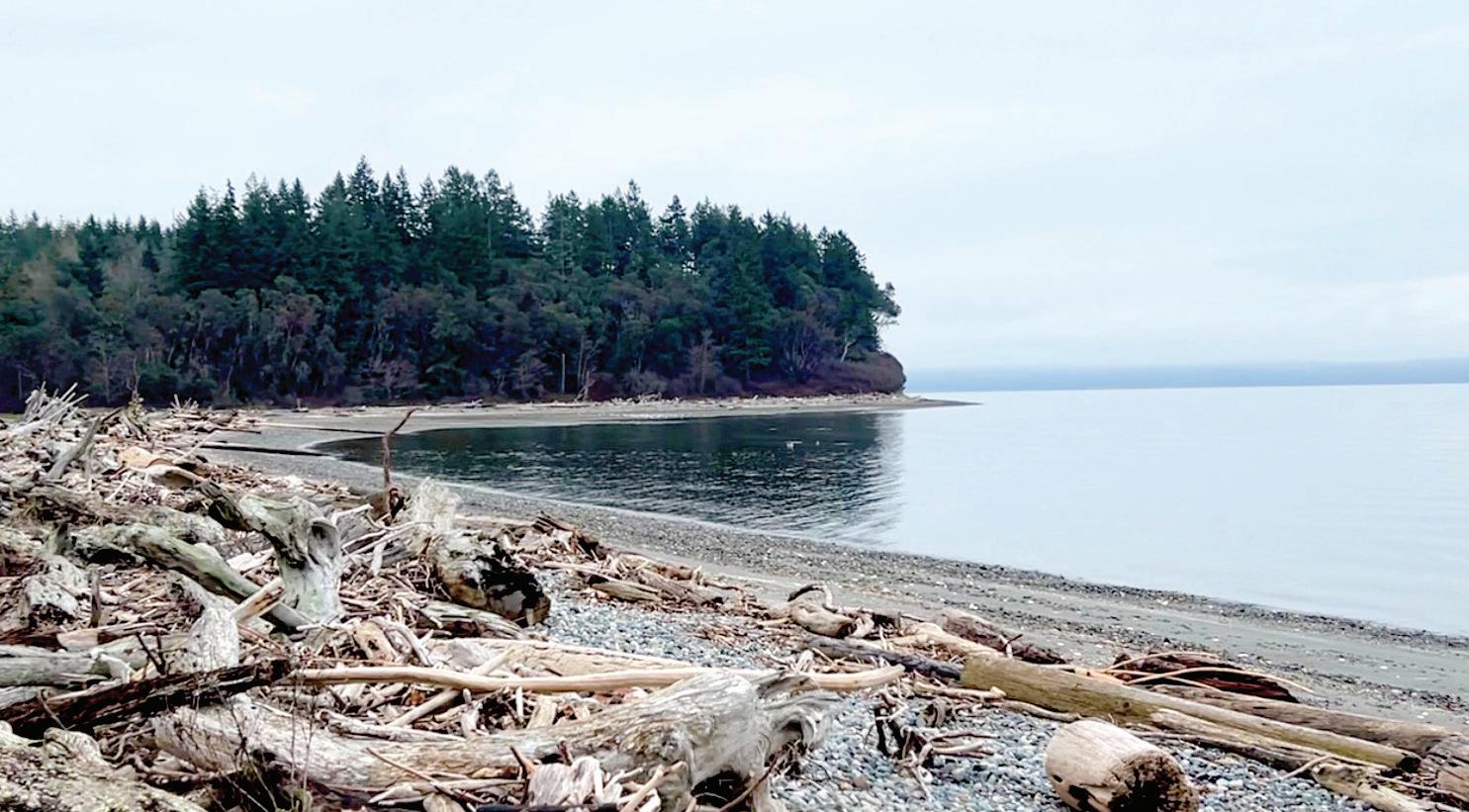
Suquamish Tribe Wellness Center at (360) 394-7139 or (360) 3948558. We are here for you.



Meatloaf Mashed
Atthe end of March, we started up BINGO again at the Elders Lodge. Everyone had a blast, joking and trying to be the first to shout out “BINGO!”
Elder Angel Hill was the champion of the day, winning a couple of Starbucks gift cards. Elders JoAnn Joe, Lorraine Brice, and Elder spouses Gene Tabafunda and Vickie Mabe also won gift cards. This was so successful that more BINGO Socials are in the works.
The Elders are working towards more collaboration on craft projects with the students at CKA. We started our first day of April at CKA, with a wonderful tour of the CKA facility by Principal Jon Claymore and Assistant Principal Sarah Houseberg.
We were very impressed with the staff, teachers and classroom, and enjoyed seeing so many bright smiling Suquamish student faces in the classrooms.
That same day was the exciting Chair Volleyball Event between Elders and the CKA students. It was a fight to the bitter end, however the Elders ended the day as champions.
Principal Claymore presented our champs with a ball trophy, and the students honored us with handmade snack bags, Native songs, and drumming, which always warms our hearts.
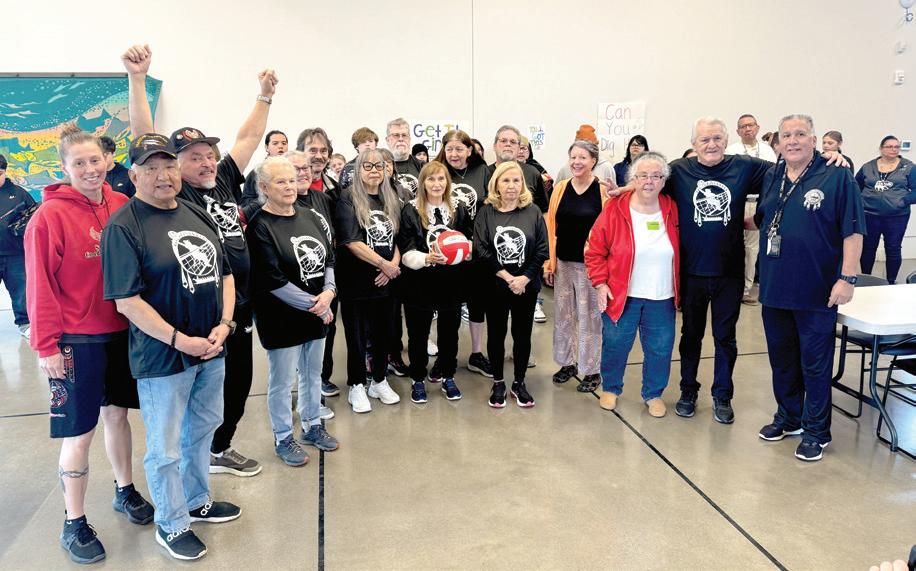
Many thanks to the Suquamish Police Department who were there to feed everyone with the barbecued hot dogs and hamburgers. And thanks to Skylene George for her hospitality and delicious macaroni & green salads. The Elders lift their hands in gratitude to CKA for this wonderful day, and are looking forward to another Chair
Volleyball tournament before the school year ends.
Our Elders went to the Chehalis Elders Honoring Luncheon on April 17. The theme was “Through the Decades” – with everyone dressing up like your favorite decade. Tracy Tabafunda and Linda Holt won raffle gifts. Some Elders danced to the tribute band Radio 80 at the luncheon. Elder Melissa Lund was photo-bombed by one of the band’s singers when dancing to Madonna’s “Material Girl. Check out the Radio 80 Facebook page if you want to see for yourself!
On April 19, the Elders went to Kitsap County Fairground Pavilion in Bremerton to watch and support our very own tribal member Roller Derby Queen Jocelyn Talmadge, aka Foxy Jocy. She’s the daughter of John and Toni Jones, and is a member of the West Sound Roller Derby Team.
They played that evening against the Rainier Roller Riot. Of course, Foxy’s team WON and she was voted Most Valuable Jammer, meaning she scored the most points. Go Jocelyn! A very exciting game!
We hope you are able to go and support her team at their next meet. Go to westsoundrollerderby.org for more info.
On April 22, our Elders made a huge vat of goulash with our own cooking instructor, Elder Marie Sanders. The secret ingredient that she uses to give an extra umami flavor to the dish is soy sauce. That’s not in our mamas’ cookbook! But there’s no denying it is delicious served over rice or noodles.
We sent extra jars to some Elders who could not attend the class. Thank you to Elders Linda Oconnor, Donna Sigo, and Cheryl Lawrence for working as sous chefs and helping with cleanup. Don’t forget the second Tuesday of each month is movie night at the Regal Theatre in Poulsbo. Look forward to seeing you next month
We send healing thoughts to Elders who are recovering in nursing homes, not feeling well, and prayers to those in need.
Happy Trails to you, until we meet again!
By Della Crowell, Melissa Lund, and Antonia Ewing Elders Program
Itis important to document this historical moment where the Suquamish people have Elders speaking our Lushootseed language again.
All our Suquamish families are affected by the boarding school traumas that occurred. All our Suquamish people have a generation in their family where the language stopped being acquired naturally. We also all have a shared history of language preservation and revitalization!
This month, we want to highlight the success of two Trial Elders – Donna Sigo and Charlene Renquist.
Both Elders finished an 8-week Lushootseed Language Course online. They overcame the technological challenges that come with an online

From the desk of the Traditional Heritage
Welcometo May 2025. We had lots of showers in April, so are we going to see spring flowers and warmer weather?
In April, I worked very hard on getting the newest information from around the U.S. on Native items that many museums still have in their collections. Many are preparing to have them returned to the various tribes. We receive emails and letters almost daily that we must review and write about the items that are possibly ours.
I am also looking forward to doing more interviews with folks that wish to share their memories with us for future generations. Anyone can be interviewed – Elders, adults, and even teens. You can be interviewed on your own or with your family.
I would enjoy your stories about life in Kitsap County, elsewhere in Washington state, or wherever you grew up and experienced changes in the area.
New technology and development have made a great impact on all our lives and the youth of today really know nothing about what life was like before cellphones, Facebook, Instagram and
course. Both tsi siʔab (honorable women) know how to access the material online and navigate a Zoom session.
In this course they learned how to introduce themselves in the language and how to talk about various things they did that day – where they went, who they saw, what they ate and drank, who they talked to, etc. This course is not the end of their language learning. But it is a very good start.
Many other Suquamish Elders are also now speaking our Lushootseed language and we thank you all for your efforts to keep Lushootseed in our community.
By Cassy George Language
Program Coordinator
Annual Updates are required to help avoid coverage and billing issues.
Some documents are not needed annually unless you move, change your name, etc.
(360)394-8424 PO Box 546, Suquamish, WA
satellite television. What was it like to go from carrying water into the house to indoor plumbing? Electricity, cars instead of horses, and party lines on the house phones.
These are just a few things we need to talk about and preserve for the next generations. If you wish to share you stories, please don’t hesitate to call me at (360) 394-8526 or email me at mjones@suquamish.nsn.us. I would love to set up an appointment to meet with you.
By Marilyn Jones
Heritage Specialist




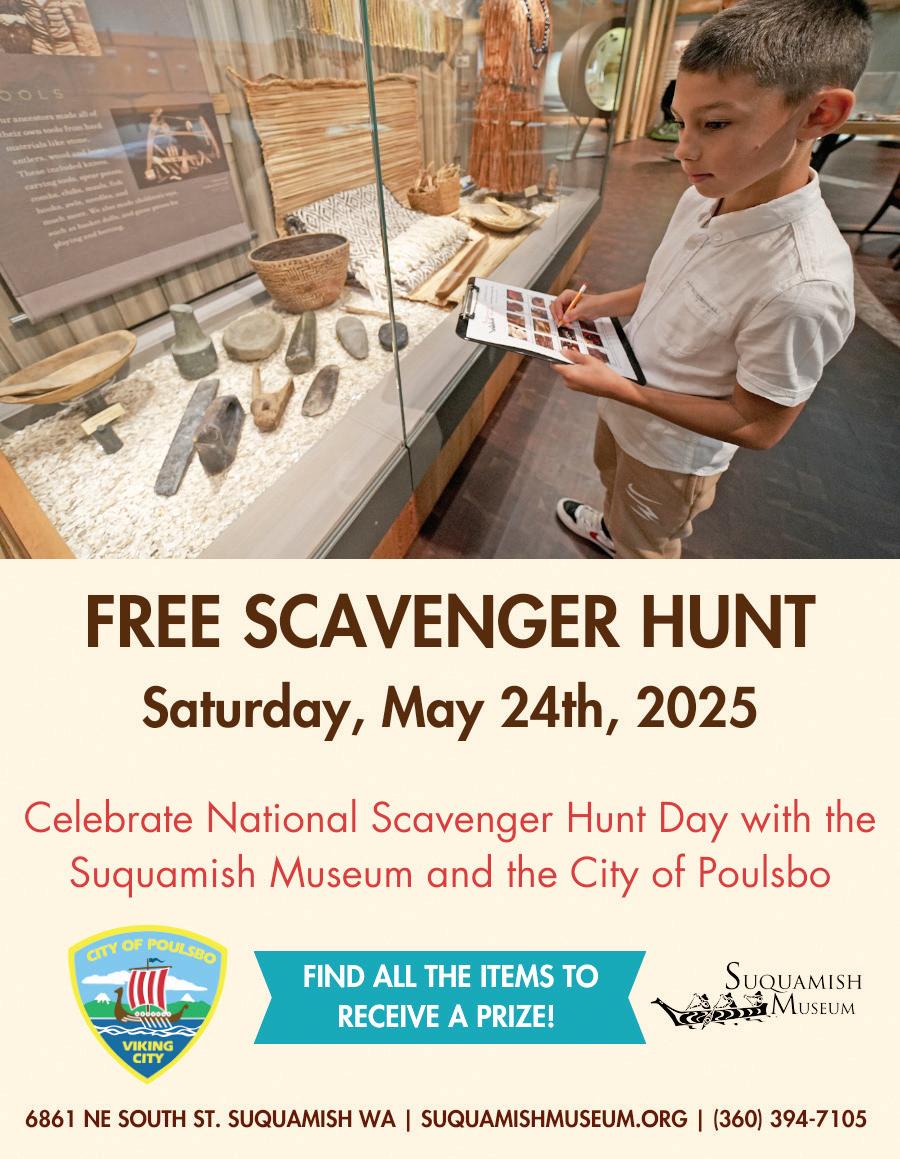

May 1
Jeanette Lawrence
Jewelian Lawrence
Kyle Purser
Rachel Duthie
Sean Mabe
May 2
Dawn Ostenberg
Malia Carper
Michelle Charette
Mieka Price
Moralani Old Coyote Williams
Robert Pastrana
May 3
Alexia Baldwin
Briann Lyons
Cindy Roberts
John Jones
Maureen Belmont
Nevaeh Gordon-Hawk
Zadia Pemble
May 4
Angela Ives
Brooke Orsen
Duane Napoleon Jr.
Eliana Edelstein
Reada Smith
Yasmeen Cruz
May 5
Agostinho Cordeiro
Brenda Guerrero
Brooke Edlen
Courtney Trask
Monique Pastrana
May 7
Corbin Eaton
Daniel Adams
Jessicca Cordero
Jordan Camacho
Leroy Henry III
No-Yectee-Hemeh Alexis
Sierra Molver
May 8
Corey Manley
Jasmine Cannon
Karleen Crow
Luke Williams
May 9
David Greer
Hayden Moss
Joshua George
Paisley Silvey
Shyla Ahvakana-Villa
Toshina Baldwin
May 10
Nancy Johnston
May 12
Cathlene Norris
Edward Cordero
Elias Neugebauer
Ellie George
Ryan Sigo
Warren Neugebauer
May 13
Angee Harrington
Christina Roberts
Emersyn Day
George Hill Jr.
Seylah McNew
Shardan Stark
Wanda Vollenweider
May 14
Bryna Lawrence
Cecelia Brown
Lori Wolfe
Mackenzie Crow
Michael George Tu-tai-ud Brealan-Bayes
May 15
Anthony Carper-Black
Jennifer Pratt
Lillian Abler
May 16
Elizabeth Lindell
Elizabeth Townsend
James Bradwell Jr.
Koen Smith
Rebekah Nelson
Tyler Tiffany
May 17
Charles Deam Sr.
Eric Glaze
Golden Hawk Jr.
Isaac Johnson
May 18
Christopher Midkiff-Quade
Dolores Mills
Kira Yaeger
Lily Stockwell
May 19
Benjamin Johnson
Christopher George-Old
Coyote
Phenix Mabe
May 20
Georgianna Ungaro
Marlane Buckner
Oliva Purser
Robert Hagen
Roxanne Cruver
Sara Purser
May 21
Braden Hess
Clyde Brown
David Zurflueh
Kayla Purser
Melissa Bruce
Samantha Midkiff
May 22
Alan Lerdo Jr.
Bonnie Brown
Brayden Napoleon
Dylan Crow
Frances Jackson
Lori Deleon
Mark Pratt
Narmine Ridani
Robin Camacho
Shawn Boushie
May 23
Amie Adams
Callum Purser
Frasier Purser
Jasmine Vollenweider
May 24
Albert Agibinik Jr.
Matthew Hawk
May 25
Arrianna Parrish-Day
Celia Williams
Charlotte Ives
Cheryl Cahill
Duran George Jimee-Mai Webster
Telisha Hendricksen
May 26
Anthony Howard
Colleen Hickerson
David Sigo III
Destiny Dubois
Madison Pool
May 27
Althea Jones
Daniel George
James Armstrong
Julian George
Nata-chee Pratt
Orion Keller
Rigel Keller
Zaylee Moss
May 28
Chelsey Hettema
Daniel Smith
Jennifer Willis
Justice Zaiss
May 29
Bernard Adams
Christine Snider
Daniel Parkhurst
Emberlly Zaiss’Schaleger
LeAnne Nilluka
May 30
Amanda Carper
Caleb Stewart
Kristina Pearson
Ronald George Jr.
William Lund
May 31
Robert Kumpf-Fleming
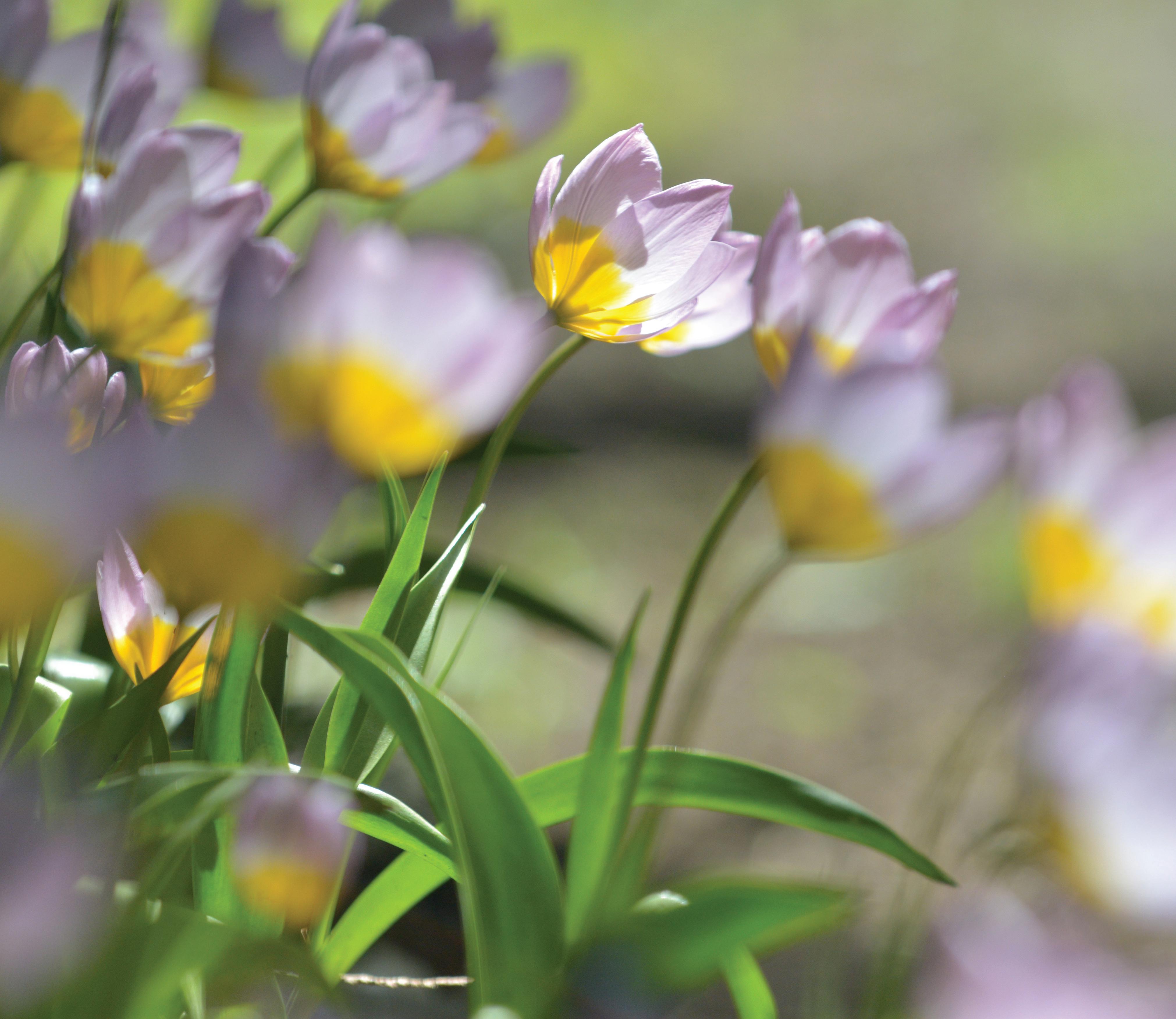
Virginia Gemmell

